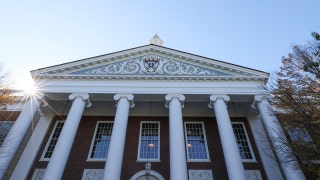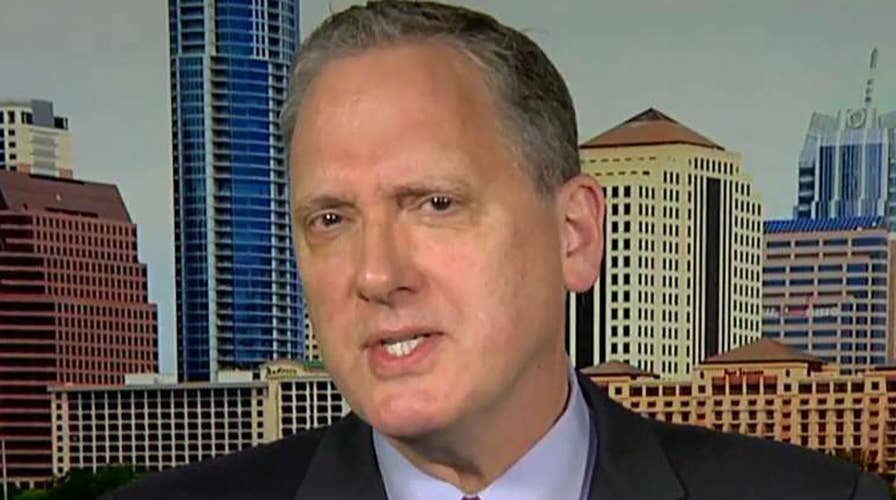Steve Adler, the mayor of Austin, Texas, was on Fox News defending his city’s homeless policies Tuesday during an interview with Bill Hemmer.
Last summer, the all-Democratic 10-member Austin City Council voted to lift the city’s ban on sleeping or camping on public property, such as sidewalks and parks – except for City Hall itself.
Immediately following the vote, Austin’s visible homeless population soared, with people passed out in the doorways of businesses, erecting tents along busy parkways and, according to police, getting hit and killed by cars.
TEXAS GOV. ABBOTT OPENS HOMELESS CAMPSITE ON STATE LAND IN FIGHT WITH AUSTIN
Responding to criticism from city residents, including Republican Gov. Greg Abbott (who lives in downtown Austin in the governor’s mansion), the City Council passed an amendment to its homeless camping ordinance last month. The new rules made it illegal for the homeless to camp within a quarter-mile of a large downtown homeless shelter.
The amended ordinance quickly pushed more of the homeless into the city’s business district, leading a manager of one of Austin’s famous food trucks to note that the increased chaos on the streets was threatening to his customers.
In his Fox News interview, Adler, a Democrat, repeatedly said the homeless problem can only be solved by giving people homes. He blamed the homelessness issue on the high cost of housing.
Adler also claimed that the new ordinance didn’t create more people experiencing homelessness, but rather simply drew them into the open from the woodlands and greenbelts where they had previously been staying, mostly out of sight.
However, a Fox News reporter recently interviewed a homeless man in Austin who had a different take, saying: “This is a famous place to live on the streets. Everybody knows that. If you want to live on the streets, go to Austin. You don’t even have to buy food. Everybody feeds you, give you money. You can party, it’s a blast.”
Adler referred to getting the homeless into homes at least a half-dozen times during his interview, mentioning medical care once. This is what’s known in policy circles as a “housing first” strategy. The mayor's intent was made clear when, near the end of his interview, he claimed that Austin needed “no barrier housing.”
What is “housing first” and “no barrier housing”?
“Housing first” is a federal policy that prohibits nonprofits receiving federal grants from requiring the people they serve to comply with service participation requirements like sobriety or job training – this is also the “no barrier housing” to which Adler referred.
CLICK HERE TO SIGN UP FOR OUR OPINION NEWSLETTER
Initially started in a limited fashion under President George W. Bush, the one-size-fits-all “housing first” was made mandatory under President Obama, and is still the policy in the Trump administration.
More from Opinion
Because up to 75 percent of unsheltered people struggle with substance abuse disorders, a one-size-fits all “housing first” policy often ends up harming the very people it purports to help – recovering addicts and domestic violence survivors – by placing them in close proximity to addicts and abusers. This incentivizes program models that don’t work.
Unlike the Trump administration’s successful approach to the opioid crisis – which recognizes individual needs – “housing first” failed to address the root causes of homelessness. For many people, the root cause of their homelessness is drug addiction and untreated mental illness. In that sense, “housing first” threatens to undermine the progress being made on the national opioid crisis.
Yes, people do need housing – but we also need to respect our fellow Americans by expecting more from them: sobriety, responsibility and – eventually – self-reliance and dignity.
Even though the Department of Housing and Urban Development has seen significant funding increases for its Section 8 rental assistance program, from $5.5 billion in 2008 to $19.6 billion in 2018, the number of Americans experiencing homelessness increased in 2018 for the second straight year. Much of that increase has occurred in Seattle, San Francisco and Los Angeles.
In a tweet on Nov. 3, Abbott noted the similarities between Austin’s homeless policies and those on the West Coast, writing: “San Francisco chose to tolerate homelessness & drug use. It did so in the name of compassion for the homeless. It made the problems worse…”
Abbott had previously called out Austin for spending more than $20,000 per homeless person with city spending expected to hit $62.7 million, a three-fold increase over five years.
The governor notified Austin officials that if they didn’t clean up the city and address the threat to public health, he’d use state resources to do so. On Nov. 4, state crews started to clean up around homeless camps under overpasses and adjacent to state highways.
Abbot announced Thursday that he has ordered the creation of a temporary homeless campsite on state land three miles outside Austin.
While some studies claim “housing first” works, those studies have been plagued with flaws, including conflicts of interest between the researchers and programs evaluated, as well as in methodology. For instance, Utah, an early adopter of “housing first,” has seen its homeless population almost double in less than three years.
CLICK HERE TO GET THE FOX NEWS APP
“Housing first” doesn’t work for the same reason the old massive federal housing projects failed, turning neighborhoods into dismal blocks of drug dealing, crime and prostitution.
Yes, people do need housing – but we also need to respect our fellow Americans by expecting more from them: sobriety, responsibility and – eventually – self-reliance and dignity.








































